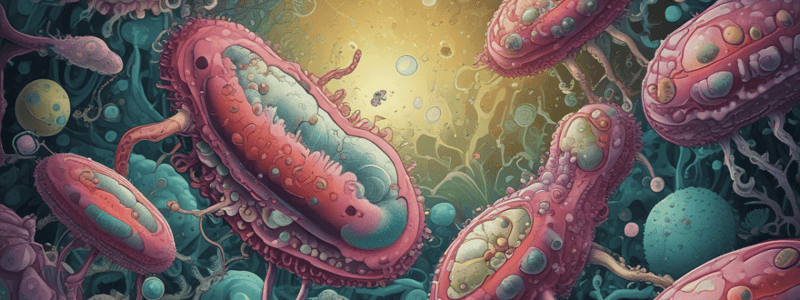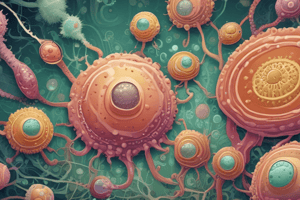Podcast
Questions and Answers
Which of the following statements about spores is NOT true?
Which of the following statements about spores is NOT true?
- it contains a complete copy of the chromosomes
- they can allow bacteria to exist in suspended animation for centuries
- it contains high concentrations of essential proteins and ribosomes (correct)
- it contains a high concentration of calcium bound to dipicolinic acid
Which of the following is a true statement about spores?
Which of the following is a true statement about spores?
- They cannot protect DNA from intense heat and radiation
- They contain high concentrations of essential proteins and ribosomes
- They allow bacteria to reproduce rapidly
- They contain a high concentration of calcium bound to dipicolinic acid (correct)
Which of the following genera of bacteria are known to form spores?
Which of the following genera of bacteria are known to form spores?
- Staphylococcus and Streptococcus
- Bacillus and Streptococcus
- Bacillus and Clostridium (correct)
- Clostridium and Staphylococcus
What function do spores serve for bacteria?
What function do spores serve for bacteria?
Which of the following is NOT a characteristic of spores?
Which of the following is NOT a characteristic of spores?
Flashcards are hidden until you start studying
Study Notes
Spore Characteristics
- Spores can allow bacteria to exist in suspended animation for centuries
- Spores contain a high concentration of calcium bound to dipicolinic acid
- Spores protect the DNA from intense heat and radiation
- Spores do not contain high concentrations of essential proteins and ribosomes
- Spores do not contain a complete copy of the chromosomes
Spore-Forming Bacteria
- Some Gram-positive (G+) bacteria, but not Gram-negative (G-) bacteria, form spores
- Examples of spore-forming bacteria include Bacillus and Clostridium
- Other Gram-positive bacteria, such as Staphylococcus and Streptococcus, do not form spores
Studying That Suits You
Use AI to generate personalized quizzes and flashcards to suit your learning preferences.




